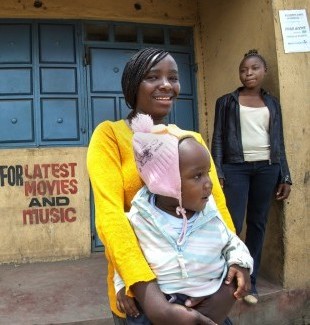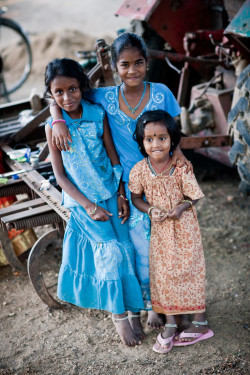
Youth
Hand in Hand wasn’t always focused on entrepreneurship. Child labour, not joblessness, drove our creation.
“While travelling in southern India I saw this terrible abuse of child labour,” explains Hand in Hand co-founder Percy Barnevik. “I started to buy them out for about US $150 a child. I was in mind to buy out 200,000 children, which becomes quite a lot of money. I realised that I had to attack the root cause of the problem: poverty.”
Ever since, we’ve been motivated by a simple truth: when parents work, children don’t have to. And that’s just the beginning. An average of five family members benefit from every enterprise we help grow and create – particularly among women, who comprise over 90 percent of Hand in Hand entrepreneurs. That’s more children in school, more parents with access to life-saving medicine and more families with sturdy roofs over their heads.
By the numbers
Child mortality rates are dropping throughout the developing world. Fertility rates aren’t. The result: people younger than 30 now make up half the world’s population. Despite promising growth rates in many Hand in Hand countries, labour markets have failed to keep up. Worldwide, more than 73 million people between the ages of 15 and 24 are jobless.
Kenya
80% of unemployed Kenyans are between the ages of 15 and 34 – more than 1.8 million people in total
India
An estimated 28 million children in India between the ages of 5 and 14 are engaged in work
Network-wide
Hand in Hand’s work has improved some 19.7 million lives, most of them children’s
“Entrepreneurship-promotion interventions activate the highest return on productive work for young people, especially when combined with access to finances.” – Solutions for Youth Employment
Youth programmes
Historically, Hand in Hand’s work with young people was limited to those who joined our regular Self-Help Groups. In the last few years, however, we’ve begun tailoring our programmes to this important and growing cohort.
In a country where youth unemployment is considered a ‘ticking time bomb’, and where the consequences of climate change are a daily reality, the aim of Hand in Hand’s Entrepreneurship Clubs is simple: to raise the status of self-employment among young people and unlock the path to success through eco-entrepreneurship. Students learn about how climate change will affect households and businesses, participate in income-generating group projects, and plant hundreds of trees in their local communities – and their doing it in their thousands.
Thanks to generous grants from the IKEA Foundation and Swedish Postcode Lottery, Hand in Hand’s Entrepreneurship Clubs are scaling up to include some 11,800 students from across Kenya. Winners of the Hand in Hand Youth Awards, given annually to the four students with best business ideas, travel to Sweden each year to present their ideas at a national youth job fair. And efforts are underway to advocate for putting entrepreneurship on the national curriculum.
Read about Hand in Hand’s Entrepreneurship Clubs in Kenya’s Star newspaper.

Halima, 18, with daughter and co-worker Irene | DVD rental shop owners | Nairobi, Kenya
Launched in Kenya in 2012, the Young Mothers Programme mobilised mothers between the ages of 13 and 30 who, despite lacking skills and training, are major breadwinners in their families. The programme combined Hand in Hand’s job creation model with psycho-social support – or, as it’s referred to by participants, “freeing of the mind” – from Clowns without Borders Sweden, a non-profit organisation that works to “spread laughter, joy and hope” to people affected by conflict and poverty. The project was funded by the Swedish Postcode Lottery.
“Success is almost guaranteed” to women who completed Hand in Hand Eastern Africa’s Young Mothers Programme, according to an independent mid-term review conducted by Brinjal, a UK-based consultancy specializing in livelihoods analysis. The programme wrapped up in summer 2015, having exceeded its targets. Almost 3,700 sustainable enterprises were created, producing 4,700 jobs. A total 13,000 children benefitted, including 9,000 who gained access to education.

Children in Kanchipuram, India
Exclusive to India, a country where bonded child labour remains all too common, Hand in Hand’s Child Labour Elimination Programme gets children out of work and into school. As a first step, Hand in Hand staff engage local stakeholders to form Child Rights Protection Committees, charged with raising awareness and identifying working children for education. The vast majority are enrolled in public schools, but in areas too remote for government education, Hand in Hand staff and volunteers establish schools of their own: preschools for toddlers, Learning Centers for children and Transit Schools for teenagers.
So far, the Child Labour Elimination Programme is responsible for 16 child learning centres, 312,500 children enrolled in government schools and 1,142 child labour-free panchayats.
